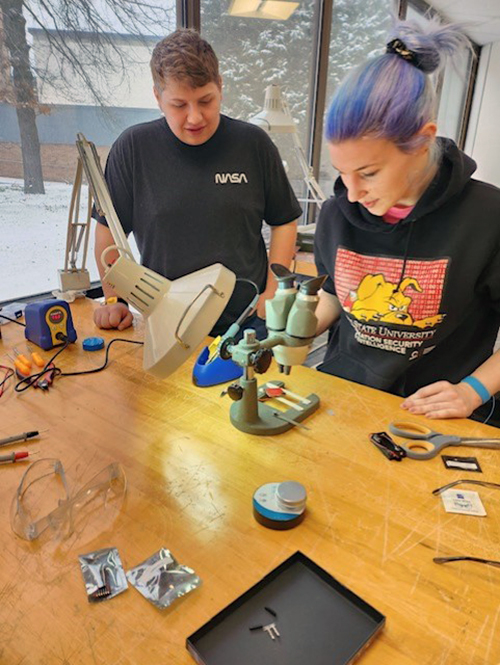
Student researchers pursuing master’s degrees and upper-level students are working
under the direction of Molly Cooper, an associate professor in the Information Security
and Intelligence program.
Satellites and Space Cybersecurity, a first-year course in Ferris State University’s Information Security and Intelligence program, now represents a significant work in progress supporting the Center for Cybersecurity and Data Science.
Student researchers pursuing master’s degrees and upper-level students are working under the direction of Molly Cooper, an associate professor in the Information Security and Intelligence program. Leading the student research is Will Allington, a graduate student from Howard City, who says this seven-week course reviews space cybersecurity.
“In an accelerated format, we will address many aspects of the space system, where an orbiting satellite has a network of ground equipment that supports its data delivery,” Allington said. “ISIN 380 is a class for juniors and seniors, where they rely on previous coursework to help make appropriate determinations in this rapidly changing communications field.”
Allington noted a wide range of orbiting communications equipment under consideration, including space vehicles weighing more than two tons to picosatellites whose mass is only a pound or two and provides a short service life in amateur communications.
“This is a subject with great emphasis on understanding the risks for these units, in terms of the very real costs that exist for the satellite owners and those they serve,” Allington said. “In early April, we will have a picosatellite that will go into a close orbit of the Earth to support our classroom activities.”
Allington said students will be exposed to amateur radio communications to prepare to use the picosatellite.
“There are unencrypted weather satellites and demodulated signals that allow the tracking of airplanes, which are valuable to build a base of information,” Allington said. “We will review transmissions supporting artificial intelligence operations, autonomous vehicle communications and data from global positioning systems. All those operations rely on cybersecurity systems to work well and emphasize safety.”
Cooper said the 380 class was a pilot offering in the Fall 2023 semester, and the half-semester course this spring is its official addition to the curriculum.
“We are very early in a five-year Education Partnership Agreement with the National Security Agency. This agreement is just one aspect of that opportunity,” Cooper said. “We are excited to be developing coursework that can be focused into a graduate certificate program to outfit professionals with the learning they need to begin careers in space cybersecurity.”
Allington agreed that their course development is valuable to the national and global community and the students who will gain from the experience.
“The race is on to place satellites, with the spectrum becoming rather crowded,” Allington said. “There are considerations in international law, and one of many goals here is to avoid the presence of ‘space junk’ through best practices that promote stewardship and careful attention to satellite operations.”

